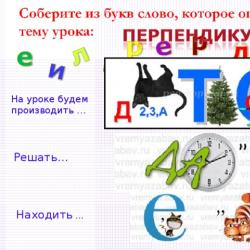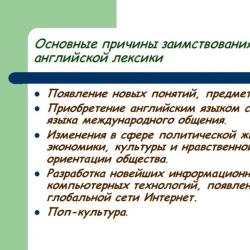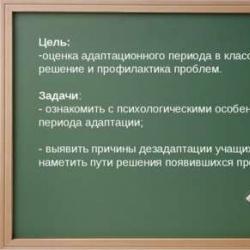Teenage vocabulary. "slang vocabulary of the modern teenager
Our topic today is somewhat frivolous, it will not have rules and boring tables. Let's talk about that special form of language or profanity, which is called slang. In absolutely any language there are terms that are not in textbooks, decent books and films.
It has been proven that jargon existed and exists at any time, is constantly changing and is closely related to the social or age group where it is used. This is most often a youth language, since it is young people who isolate themselves from the world of adults and create their own world, with their own laws and even language. But very quickly such words break out of the youth group and become ubiquitous.
Our task today is to understand the features of modern English and whether we need to know at all youth slang Isn't it enough just to master the grammar and colloquial speech?
- bursa - seminary
- to fund - to treat
- fiducia - enterprise
- cool - comrade
- shtram kula - a good friend
Of course, today such words are deeply archaic.
Youth slang is constantly changing and is closely related to the history and culture of the country. It often occurs where there is a protest youth movement against something.
The main sources of our youth slang

The main language sources of American slang: 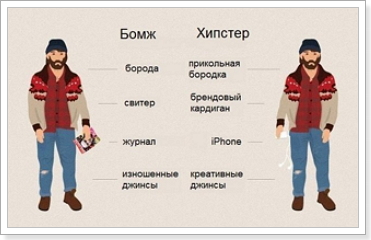 american slang
american slang
- immigrants
- beatniks, tramps, hippies
- drug addicts, underworld
- army, navy
- business
- students, pupils, teenagers
- jazz and cutting edge music
- sports (American football, baseball, etc.)
- Hollywood movies
As you can see, the origins of modern Russian slang and English are somewhat different. Our slang can be called more cultural, it is mixed with proverbs and verbal puns. I really liked these "alterations":
- God once sent a piece of cheese to Voronezh...
- Posner is better than never!
- We were born to make Kafka come true!
Believe me, if we were brought up on the "great" and "mighty", and the origins of our obscenities originate from Pushkin's poetry itself, then is it really impossible for us to overcome English slang?
Grammatical features of English slang
Difference between English grammar and colloquial speech, you can feel immediately, having arrived in English speaking country. Such abbreviations can be considered elements of slang:
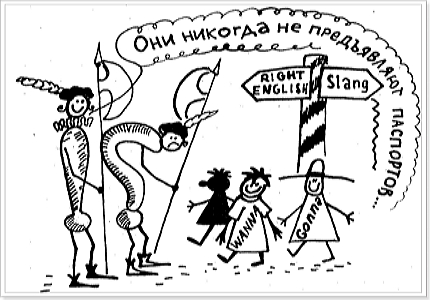
- gonna- going to
- wanna - want to
- Ama - I'm
- Yep, ye-yes
- Dis-this
- U - you
- Dunno - don't know
- cause-because
And many words can have both ordinary and slang meaning. For example, these words:
- cool - cool, fresh - cool, cool
- to bless you - bless you - be healthy (after sneezing)
In this article, you will not see familiar grammar rules on how to correctly form a slang expression. Slang has no grammar, it is a kind of denial of any norms of grammar. And yet, you must write and use the slang dialect correctly if you have already decided on it, otherwise you risk using a word that is completely different in meaning and you will find yourself in a situation that is funny or not very good for you.
When writing and speaking, be careful!
Surprisingly, sometimes just one letter can change the meaning of a word in a language. So, adding the letter -s to an innocent particle - as(how) turns a particle into an insult
For comparison: if to the Russian particle - how add one letter, then something will also turn out :-), not so terrible, true, but similar in meaning.
So when you write, be careful! One letter can ruin everything. Also, if you speak slowly, and even whistle on the letter -s, it is better to avoid turns where there is the given particle is -as.
Another tip: when describing someone's appearance in English, also look first into the modern slang dictionary, remember how to make elementary sentences, as well as a cartoon " Who will praise me the most."
Remember? Girl, you have big eyes (big eyes)- Beautiful, is not it? Further - big ears(big ears) - well, that's all right. But say in English tongue twister (and even without any -have /has) big mouth(big mouth) is fraught, since bigmouth they mean: Chatterbox, yap.
And we will speak better in Russian! - you decide, and again you will not guess. This will not relieve you of the need to know some elements of local youth slang, since some Russian words are similar to English curses. For example, never say "bananas" loudly on the street if you are in America: bananas translated crazy!
In no case do not brag in the English youth campaign that you learned the language from the famous, world-famous. Cause an avalanche of laughter, because bonk They have one well-known obscene word.
Useful information for travelers
But in English language There are also slang words that sound similar to Russian ones:
- bastard - illegitimate, bastard
- gaga - dumbfounded, eccentric
- tits - chest
There are also words that have migrated from English slang to us and do not require translation:
- baby - baby
- cop - cop, policeman
- fake - to tease, to fool
- cash down - money for a barrel
- zero cool - super, cool
Here are some more relatively harmless words and expressions of modern English slang:
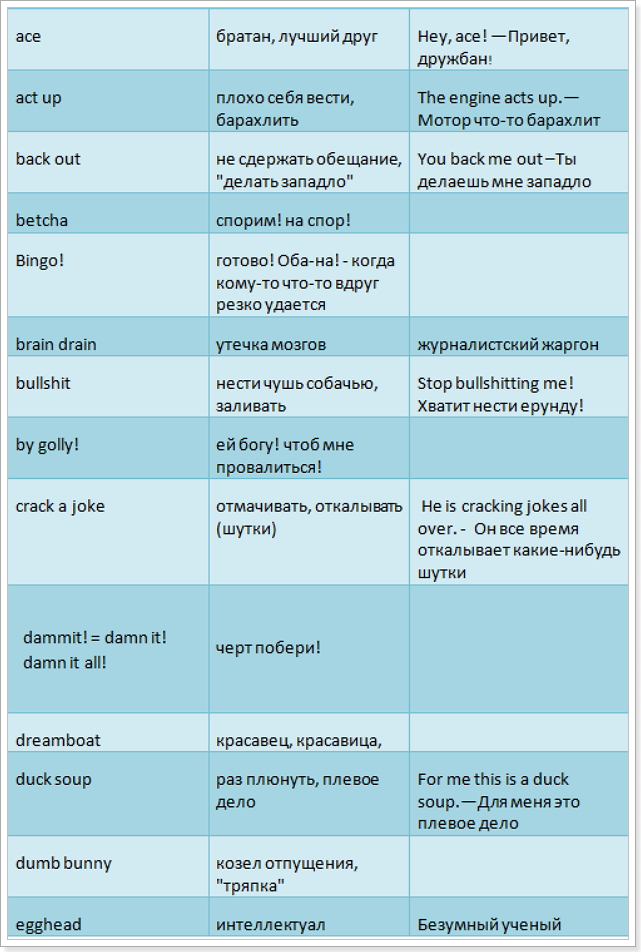
British and Americans often do not understand each other
It is necessary to distinguish between English and American slang. Some words and phrases in England mean one thing, but in America they mean something completely different. There are many funny stories about how people get into trouble by not using local terms correctly.  Slang? Chief. The English are generally extremely polite people, and usually, if they use slang, then by the meaning you can guess what they are talking about. Whether business cheerful Americans, at them even the word sorry does not always mean an apology. If an Englishman will apologize to you thousands of times for every little thing, then do not expect this from an American. They are quite simple people in communication and are not used to manners, so if you suddenly hear that they say sorry to you, then do not rush to rejoice: it is quite possible that you have violated something, and there is a policeman in front of you
Slang? Chief. The English are generally extremely polite people, and usually, if they use slang, then by the meaning you can guess what they are talking about. Whether business cheerful Americans, at them even the word sorry does not always mean an apology. If an Englishman will apologize to you thousands of times for every little thing, then do not expect this from an American. They are quite simple people in communication and are not used to manners, so if you suddenly hear that they say sorry to you, then do not rush to rejoice: it is quite possible that you have violated something, and there is a policeman in front of you
Here are the meanings of some words:
Here are some fun examples.
In order to learn how to speak youth slang, you need to learn the most common words and expressions from the dictionary of slang or jargon, hear their pronunciation live. Do not use dubious "samizdat" with unscrupulous translation when the works of famous linguists have been published on this topic. Yes, yes, it would seem, some kind of jargon, and scientists were involved in order to qualify it.
I think you are convinced that in order to know and use the terms of youth slang, you need to be a literate person. This is not a contradiction. If you decide to learn English slang first, and only then grammar, you will look ridiculous and ridiculous: you know, you don’t know anything, but you swear like a shoemaker. It is unlikely that you will command respect even among the youth. For them, this is their lifestyle, but for you, clowning and attempts to "cling" to the young. Slang, after all, must also be masterfully mastered. Therefore, first grammar, and only then leave youth slang for a snack.
There is nothing worse than when a non-native speaker tries to speak in slang. What for?
It can be funny at best, annoying at worst.
Slang needs to be mastered in exactly the same way as other speech styles, and it is even more important to know when and with whom to use it.
Avoid using harsh vulgar words when you can find similar but milder expressions. Remember that swearing and slang are two different things, and today using blatant swearing is a sign of bad taste.
Today, slang is used in politics and art. You don't have to look far: almost every American film today contains slang expressions, and the famous animated series "South Park" broke all records for the amount of obscene language. In the stands, in newspapers, on TV, they are also not shy in expressions. Today, Americans themselves are protesting against such an abundance of dirty speech in their lives.
So what have we learned about English slang:
- this is an important part of the language and you need to know it
- it should be used only as needed and give preference to non-rigid forms
- priority should be on the side of grammar (first learn the language itself, and only then slang)
- English and American slang are different
- he needs to be taught modern dictionaries youth slang, and not from dubious sources.
Kryukova Julia
Communication is one of the most important areas of life for a teenager. The formation of the future personality depends on how communication develops. When communicating, the speech of adolescents leads to indignation of teachers, parents, representatives of the older generation, who react sharply to expressions cutting their ears.
Indeed, there is something to worry about: according to latest research, in adolescence, the degree of jargonization of speech exceeds 50% for boys and 33% for girls, i.e. zashib, fly away, cool, waste, cool and similar words half replace literary expressions. Therefore, this topic interested me.
To study this topic, the goal was set: to identify what is the meaning of using the words of youth slang in the speech of schoolchildren, young people aged 20-27 years.
Download:
Preview:
District scientific and practical conference
"Thought. Image. Word"
Modern youth slang
Kryukova Julia,
MOU "Keulskaya secondary school", 8th grade.
Supervisor:
Shlepkina Nina Alexandrovna,
teacher of Russian language and literature
II qualification category
MOU "Keulskaya secondary school"
Introduction | ||
Main part | ||
The role of slang in Russian. | ||
types of slang. | ||
Conclusion | ||
Bibliography | ||
Application |
I.Introduction
Communication is one of the most important areas of life for a teenager. The formation of the future personality depends on how communication develops. When communicating, the speech of adolescents leads to indignation of teachers, parents, representatives of the older generation, who react sharply to expressions cutting their ears.
In fact, there is something to worry about: according to recent studies, in adolescence, the degree of jargon of speech in adolescence exceeds 50% for boys and 33% for girls, i.e. hurt, fly away, cool, waste,cool and such words half replace literary expressions. Therefore, this topic interested me.
The relevance of the problem lies in the fact that youth slang is one of the components of the process of language development, its replenishment, its diversity.
To study this topic, the goal was set: to identify what is the meaning of using the words of youth slang in the speech of schoolchildren, young people aged 20-27 years;
To achieve the goal, the following tasks were defined:
To study theoretical information about youth slang;
To monitor the speech of students of the Keul secondary school;
Distribute the words of youth slang into groups;
II. Main part
- The role of slang in Russian
During the 20th century, the Russian language fell into serious crisis situations three times, which gave rise to three powerful waves of development.
The first is connected with the First World War, the revolution of 1917 and the civil war and devastation that followed it.
A period not only of decisive oblivion of the classical Russian language of the 19th century, slightly hazy and veiled with decadence" silver age", but also the time of the most powerful jets of new words and grammatical renewals. All revolutionary grammar, style and vocabulary were introduced into the Russian language not only and not so much by the leaders of the revolution, but by young revolutionaries.
No less powerful, but a different stream of language development was its criminal and hooligan democratization. This linguistic wave was introduced by a class of homeless children, in terms of numbers quite comparable to the class of proletarians, according to the data of 1922, there were up to seven million of them, or about five percent of the total population of the country.
It was then that a unique phenomenon of a mixture of jargon and slang arose - a fundamentally open speech of self-expression.
The second wave is associated with the Second World War. Actually, almost everything was repeated again: state-owned children (Suvorov and Nakhimov) homeless children, fatherlessness ... "The influence of the war and the hardships associated with it affects, unfortunately, in another way. The boys had a break in their studies. They wandered from city to city, were in evacuation, and parents did not always have enough time to monitor the correct development of children.For many, speech suffers from errors against the laws of the Russian language, it is sloppy,
jerky, overloaded with superfluous words.
If the first, revolutionary, situation of abandoned and abandoned children was hooligan due to the complete orphanhood of children, then the second is a military thieves' situation due to fatherlessness.
The third wave was the most powerful and longest. It has been going on for more than 10 years and it is not known how long it will last.
With perestroika and the subsequent openly criminal democratization, the Soviet man, Soviet morality, the Soviet family, the ideological cell of society, collapsed. Parents were predominantly moral bankrupt in the eyes of their children. This moral orphanhood of an entire generation is a much more terrible phenomenon than it seems.
If in the two previous waves the destitute childhood and its language were opposed by official morality, now there is nothing like that, and the media work frankly and selflessly not against, but for moral permissiveness, new language. The main thing that is happening is the liberation of language from the paths of morality. It's just a little scary that the Russian language is freed from any morality. Do any of us understand the consequences of this freedom?
- Types of slang
For two weeks I watched the speech of my classmates, peers, friends.
As a result, it turned out that the words of youth slang that they use in speech can be included in the following groups.
1. Emotional words and expressions.This includes, first of all, such words as pancake, firs - paly, used in jargon only as emotional exclamations. Words like crust, cool, fly away, plague, etc.
Depending on the situation, these motives can express a variety of up to opposite emotions: disappointment, irritation, admiration, surprise or joy. At the same time, more or less adequate "recognition" of the expressed emotion by the listener cannot be carried out without taking into account the intonation, facial expressions, gestures of the speaker, as well as the context.
Emotional units expressing generally positive emotions: cool, cool, high. The meaning of the above words can be conveyed by the words "good", "excellent".
Emotional units expressing generally negative emotions: gloom, gloom, jamb, bummer. The meaning of these words is reduced to the meaning of "bad", "terrible".
2. Words and expressions with emotional meaning.These emotional units are characterized by the fact that, while functioning in speech, they not only express emotional condition speaker, but also name the emotion he is experiencing. This, first of all, includes verbs like: baldet, get high, trudge. Phraseological combinations: to be in treason, to precipitate and others. It should be noted that, as in the previous case, the experienced emotions are not expressed specifically, but in the most general view as a state of psychological comfort or, conversely, discomfort.
3. Words with an emotional component of meaning.These words have a certain meaning and an emotional component that conveys the emotional attitude of the speaker to the listener. Among the units of this category, vocabulary prevails, which we tend to characterize as familiar. At the same time, familiarity means an emotional connotation that occupies the first step in a series of emotions: familiarity - contempt - neglect - humiliation. So, in the speech of schoolchildren there are jargon: teacher, class girl, daddy (representative of the older generation). The use of these expressions does not have the function of evaluating the people called (the teacher is not a "bad teacher", but just a teacher).
In the use of jargon by older young people, there is also a tendency to use familiar vocabulary in relation to socially significant phenomena traditionally respected in society: parents (ancestors);
4. Emotional sayings.In their form, they are similar to incentive constructions that have "the meaning of an expression of will addressed to the interlocutor", but unlike these constructions, emotional speeches do not at all suggest immediate execution by the addressee of the speaker's will, especially since from a logical point of view this would be absurd ("go you feed the hedgehogs", "go vacuum the desert"). All these statements demonstrate the speaker's irritation with the interlocutor and, as a rule, the desire to stop communicating with him.
These are the main categories of slang vocabulary associated with the expression of feelings and emotions. Of course, even with a superficial glance at the slang material, it becomes clear that the available words do not reflect the entire spectrum. emotional experiences and human conditions. But one should not forget that youth jargon quickly updates its lexical composition, replenishing with new units, and already, therefore, further research in this area can lead to unexpected and interesting results.
I conducted a survey among students in grades 5-11.
30 boys and 20 girls were interviewed.
There were the following questions: “How do you feel about the fact that there are a lot of slang words in the speech of young people?” The boys admitted that they do not always use these words appropriately, and the girls answered that slang words fly out on their own.
"Would you like to get rid of them?"
The vast majority of them, although they use slang words in speech, but want to get rid of it.
"What do you use slang words for?"
30% of the respondents now use these words, because they give the speech a liveliness, a humorous meaning, because other students say so.
With the help of slang, the speaker can most fully and freely express his feelings and emotions.
I have compiled a dictionary of words often used in the speech of schoolchildren (see Appendix).
III. Conclusion
- During the study, it turned out thatRussian youth slang is an interesting linguistic phenomenon, the existence of which is limited not only by certain age limits, as is clear from its nomination itself, but also by social, temporal, and spatial limits.
- Youth slang words are divided into four groups: emotional words and expressions,words and expressions with emotional meaning,words with an emotional component of meaning,emotional speeches.
- Slang was, is and will be in the vocabulary of youth. Is it good or bad? The issue appears to be debatable. Slang can neither be banned nor abolished. It changes over time, some words die, others appear, just like in any other language. Of course, it’s bad if slang completely replaces normal speech for a person. But modern youth Absolutely without slang it is impossible to imagine.
IV. Bibliography
1. Beregovskaya E.M. Youth slang: formation and functioning // Questions of linguistics, 1996, no. 3, p. 32-41
2. Bobakho V. A., Levikova S. I. Modern tendencies youth culture: conflict or continuity of generations?//Social sciences and modernity. - 1996. - No. 3. - S. 56 - 60.
3. Borisova - Lukashanets E.G. Modern youth jargon // IT. 1980. No. 5.
4. Grachev M.A., Gurov A.I. Dictionary of youth slangs. Gorky, 1989.
5. Ermakova O.P., Zemskaya E.A., Rozina R.I. Words we've all met. Explanatory dictionary of general jargon. M., 1999.
6. Zhuravlev A.F. Foreign borrowing in Russian vernacular (phonetics, morphology, lexical semantics) // Urban vernacular. M., 1984, p. 102-120;
7. Zapesotsky A.S., Fine A.P. This incomprehensible youth. M., 1990.
Application
Bazaar - conversation, discussion of any topic;
Catch up - understand;
Check it out - try it;
To score - to stop doing something;
Ignite - catch;
Parallel - no matter what
Live in raspberries - live richly
Square - apartment;
Jamb - something done wrong;
Roof - protection;
Kent is a guy;
Cool - great;
Treat - lie;
Left is not right;
Crap - nonsense;
Mutate - make friends
Nadybat - find;
Bummer - something doesn't work;
Sucks is nonsense;
Otpad, go nuts - great;
To roll away - move away;
Slow down - slow down;
Khavchik - food;
Squeeze - crawl forward;
The box is a TV.
Preview:
To use the preview of presentations, create a Google account (account) and sign in: https://accounts.google.com
Slides captions:
Completed by: 8th grade student Yulia Kryukova Supervisor: Teacher of Russian language and literature Shlepkina Nina Aleksandrovna Modern youth slang
Purpose: to identify what is the meaning of the use of youth slang words in the speech of schoolchildren, young people aged 20 - 27 years; To achieve the goal, the following tasks were defined: - to study theoretical information about youth slang; - to monitor the speech of students of the Keul secondary school; - distribute the words of youth slang into groups; - make a dictionary of youth, often used in speech;
During the 20th century, the Russian language fell into serious crisis situations three times, which gave rise to three powerful waves of development. The first is connected with the First World War, the revolution of 1917 and the civil war and devastation that followed it.
1. Emotional words and expressions. This includes, first of all, such words as pancake, firs - paly, used in jargon only as emotional exclamations. Words like crust, cool, fly away, plague, etc. 2. Words and expressions with emotional meaning. These emotional units are characterized by the fact that, functioning in speech, they not only express the emotional state of the speaker, but also name the emotion he is experiencing. This, first of all, includes verbs like: baldet, get high, trudge. Phraseological combinations: to be in treason, to precipitate and others.
3. Words with an emotional component of meaning. These words have a certain meaning and an emotional component that conveys the emotional attitude of the speaker to the listener. Among the units of this category, vocabulary prevails, which we tend to characterize as familiar. At the same time, familiarity means an emotional connotation that occupies the first step in a series of emotions: familiarity - contempt - neglect - humiliation. So, in the speech of schoolchildren there are jargon: teacher, class girl, daddy (representative of the older generation).
4. Emotional sayings. In their form, they are similar to incentive constructions that have "the meaning of an expression of will addressed to the interlocutor", but unlike these constructions, emotional speeches do not at all suggest immediate execution by the addressee of the speaker's will, especially since from a logical point of view this would be absurd ("go you feed the hedgehogs", "go vacuum the desert").
Poll 1. How do you feel about the fact that there are a lot of slang words in the speech of young people? 2. Would you like to get rid of them? 3. What do you use jargon for?
In the course of the study, it turned out that Russian youth slang is an interesting linguistic phenomenon, the existence of which is limited not only by certain age limits, as is clear from its nomination itself, but also by social, temporal, and spatial limits.
Conclusion Slang was, is and will be in the vocabulary of youth. Is it good or bad? The issue appears to be debatable. Slang can neither be banned nor abolished. It changes over time, some words die, others appear, just like in any other language. Of course, it’s bad if slang completely replaces normal speech for a person. But it is impossible to imagine modern youth without slang at all.
Treat - lie; Left is not right; Crap - nonsense; Muddle - make friends Nadybat - find; Bummer - something doesn't work; Sucks is nonsense; Otpad, go nuts - great; To roll away - move away; Slow down - slow down; Khavchik - food; Squeeze - crawl forward; The box is a TV.
Thank you for your attention!
Shishkova Dina Dmitrievna
Faculty student foreign languages, 4 course, KSU, Kursk
Zabelina Nadezhda Alekseevna
Scientific supervisor, Ph.D. ped. Sciences, Associate Professor, KSU, Kursk
Introduction
The national language is the property of the whole people, the common language of the whole nation. This phenomenon is quite complex, since the national language exists in several forms. The highest form of the Russian language is the literary language, that is, the normalized language. The literary language serves various spheres of human activity: politics, science, office work, legislation, culture, interethnic communication.
The concept of a national language is broader than the concept of a literary language. Apart from literary language it also includes non-literary variants of the language, an important part of which is slang.
The concept of slang is interpreted by different specialists in different ways, up to its complete denial (I.R. Galperin). It should be noted that in this article slang is considered in accordance with the modern interpretation given in the dictionary of the Russian language by T.F. Efremova: “slang is the speech of any socially or professionally closed group of people, which differs from the commonly used language by a large number of words and expressions (including number of artificial, sometimes stipulated) characteristic of a given group of persons ".
So, slang is a secret, code language of certain groups, professions, ages, which distinguishes them from the background of others, fencing them off from the whole world. This work is devoted to the slang of one of the most closed groups - the slang of teenagers.
By creating its own special language, any community fences itself off from others, dividing people into their own (who know the language "passwords") and strangers (who speak "wrong", in a different way). Adolescents, more than other age and social groups, tend to isolate themselves, painfully reacting to intrusion into their own environment. Therefore, language plays such an important role in the relationships of adolescents: in order to be “one’s own”, one must speak the “common” language, one must understand what peers say.
The problem of teenage slang is extremely relevant for many scientific directions: for developmental psychology, since the special language created by adolescents, which is a kind of pass to their world, is at the same time one of the reasons for misunderstanding between adolescents and adults; for linguistics, since adolescence is most characteristic of a creative approach to life, and it is teenage slang is currently one of the most interesting language subsystems.
Among other things, learning the language of adolescents is the most important social task, because misunderstanding, "generational conflict" violate the microclimate in the family. Parents think that their child is speaking to them in different languages, this causes quarrels and reproaches, leading to mutual alienation.
Unfortunately, at the moment in our country the problem of teenage drug addiction, homelessness, crime, and teenage suicides is very acute. Without trying to belittle the complexity and complexity of the problem, we see one of its reasons for the lack of understanding by adults of the language of the world of adolescents. As the great Greek thinker Pythagoras once said: “To know the customs of any people, try first to learn their language.” Children and teenagers are the future of Russia, and we adults need to understand their problems, dreams and aspirations.
Problem History
Surprisingly, teenage slang has been little studied in Russian linguistics - the attention of linguists has been focused on youth slang. Philologists made their contribution to the study of youth slang: E.M. Beregovskaya, N.E. Samsonova, T.V. Zaikovskaya and others. Only in last years the works of young linguists began to appear, studying the speech of teenagers as a phenomenon.
It is necessary to clarify that in the works of some linguists the concepts of youth and adolescent slang are combined. So E.M. Beregovskaya, describing "three turbulent waves of development of youth slang" (20s, 50s, 70s-80s), does not draw a clear line between the terms, thereby making them identical: "revolution and Civil War, having destroyed the structure of society to the ground, gave rise to an army of homeless children, and the speech of adolescent and youth students, which was not separated from the homeless by impenetrable partitions, was colored with many thieves' words.
A similar classification is found in the works of many modern linguists: candidate of philological sciences K.K. Aguzarova in the article "Youth slang" cites the same periodization as an illustration of the development and formation of youth slang. The author also notes an essential feature of domestic works on slang “some linguists, as if ashamed that they have taken up the study of such an “unworthy”, “low” subject, begin or end with calls to combat it and justify their study by the need to deeply study evil in order to know how best to deal with it
It should be noted, however, that adolescent slang has also been an area of study for representatives of other sciences. Soviet psychologist I.S. Kon in the book “Psychology of early youth” wrote about teenage speech: “Children’s word-creation touching adults is distinguished by naive, vivid imagery. Youthful word creation is more often perceived by adults as a distortion of the language. The terms introduced by adolescents are rude, emphatically conditional, very often words are given a meaning opposite to their normal meaning. But this conditional ... jargon, which, by the way, has existed at all times, fulfills very important communicative functions» .
Teacher A.V. Mudrik noted that teenage slang is not homogeneous and can be divided into layers. Behind the imaginary commonality of realities lies a completely different social life. The slang of teenagers from small towns and villages, "using a lot of vulgarisms" differs from the slang of their metropolitan peers, whose speech "to a large extent consists of" anglicisms "". As well as the slang of different social strata is not identical, differing in the measure of its expression.
In addition to social stratifications, informal groupings should also be noted. Popova N.N. and Shvaibovich E.A. write: “Adolescents more often than adults tend to unite in informal groups. This is due to their natural desire to unite in the conditions of "abandonment" and hostility of the adult world .... " . Such informal groupings include: punks, goths, emo, gopniks, etc. Each teenage association has its own slang, which stands out against the background of the "general" teenage slang. However, in this study the slang of informal groups was not included, because among the students surveyed there were no representatives of certain associations, and the Internet communication of “informals” is mostly hidden from prying eyes.
Features of Russian teenage slang
In the course of work on the article, the slang of Russian teenagers was studied on the material of Internet forums, chat rooms, social networks: a forum for teenagers http://shokoladclub.com/forum, a teenage chat and forum predkov.net, social networks Twitter and Vkontakte. A survey was also conducted, including and not included monitoring of students in grades 7-11 (aged 13 to 18 years) of schools, lyceums and gymnasiums No. 5, 6, 25, 32 and 36 of the city of Kursk. 84 teenagers took part in the survey, including 18 boys and 21 girls aged 16-18, 27 boys and 18 girls aged 13-15.
Conducted in the course of pedagogical practice, observation of students in grades 7-11 showed that almost all adolescents use slang in communication. The survey confirmed the results of the observation: to the question "Do you use slang in everyday communication?" 34.5% answered "often". Only "decent" slang words are used in communication by 15.5% (out of boys aged 16-18, no one chose this answer option); the answers “rarely” and “sometimes” were preferred by 20.2% and 29.8% of respondents, respectively. The distribution of responses by groups is shown in Figure 1.
Figure 1. Distribution by groups of respondents of answers to the question "Do you use slang in everyday communication?":
a) only "decent" words; b) often; c) rarely; d) sometimes
As observation shows, the first and most obvious characteristic feature of the slang of Russian teenagers is high expressiveness. Common words and expressions are given a new meaning, based on some similarity with their original meaning:
- a gun - very bad; extraordinary ( It's just a gun!);
- dig- to annoy, to ask in detail about something ( What are you getting at me?);
- drive- brazenly lie ( Stop driving);
- excuse, otmaz,(also e smear) - justification, excuse (justify, help avoid punishment);
- take out the brain, load- provide unnecessary information, read notations ( In English, just downloaded today. Yes, just brainwashing.
Teenage speech, more than senior speech age groups, borrowings from the English language are characteristic:
- use ( from English . use) - use ,
- din, din ( from English. game) - play ,
- pliz ( English please)- please ,
- random/random ( from English . random) - at random ;
- hate ( from English . hate) - hate ;
- hi, hayushki - hello ( English hi) "people hayushki" ( English people- people );
- squirt ( German sprechen), spit ( English speak) - speak (You are spewing in English with us).
This phenomenon is due both to the desire of adolescents to express their negative or positive attitude more vividly, more emotionally, and constant clash with foreign vocabulary. Moreover, as a rule, English words shorter than Russian ones, and their use realizes the desire of schoolchildren to "accelerate" speech. Note that all the adolescents surveyed study English as a foreign language.
The reverse trend should also be noted - the translation of foreign expressions and proper names into Russian. However, such a translation is in the nature of a mockery: the i-phone product of Apple (apple) is called the “apple phone”, bluetooth is called the “blue tooth”.
A huge influence on the speech of adolescents is also exerted by the computer and, in particular, the Internet: comp - a computer , Monique - monitor , beech - notebook . In recent years, the so-called "social networks" are gaining more and more popularity, from where such words as: post- message (from English post), ban - to block (from English ban– to prohibit). Meanwhile, the results of the survey showed that the actual computer slang, slang, which is the modernization of the vocabulary of programmers (even such words as lamer, windows, screw etc.) did not enter the everyday life of teenagers. Many children could not explain the meaning of these words.
A survey conducted among schoolchildren in the city of Kursk showed that more than half of adolescents (48 out of 84) spend more than 3-4 hours a day on the Internet. 13 people stay in touch all day (at school they communicate in ICQ and in social networks by phone). It should be noted that more than half of older teenagers spend all the time spent on the Internet communicating, while among younger teenagers there are less than a third of them.
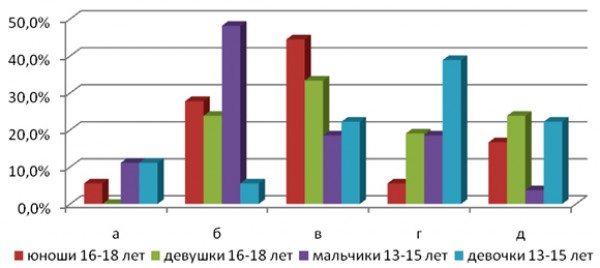
Figure 2. Distribution by groups of respondents of answers to the question "Do you spend a lot of time communicating on the Internet?":
a) I do not communicate at all; b) less than 30 minutes a day;
c) 1-2 hours a day; d) 3-4 hours a day; e) all day long
The age and gender dependence of the intensity of Internet communication is interesting (see Figure 2).
In both age categories, girls turned out to be more sociable than boys, however, the older girls become, the less time they spend on virtual communication: among boys of all ages, about 22% communicate on the Internet for more than two hours a day, among 13-15-year-old girls - 61 %; among 16-18-year-old girls - already 43%.
A comparative analysis of the open correspondence of adolescents in chats (more than four thousand messages) and their oral speech showed that Internet slang in to a large extent words that are softened equivalents of taboo vocabulary are characteristic. Almost the same result was shown by the survey.
The fact that communication is conducted without personal contact significantly affects the emancipation of vocabulary. On the Internet, you can call yourself a different name, hide all your fears and complexes, come up with a completely different story for yourself. A teenager who feels completely safe, conducting a conversation as if from a “different person”, can afford expressions that balance on the verge of decency: zadolbat, fucked up, bully, damn it. Words are used, long ago, borrowed from past generations from criminal jargon: hang out, hang out, rubbing.
The frequency of the formation of new words by reducing, distorting old ones: ignore instead of ignore, register - register, lope - how much, right - right, current - only, ATP, thank you - thank you. This trend is explained by the accelerated pace of life of adolescents and the ostentatious denial of the need to speak correctly. There is also a deliberate disregard for the rules of spelling: "I'm walking with asipki!".
I would like to emphasize that people of the older generation are accustomed to more literate written speech, the absence of even a hint of taboo vocabulary in it. This is due to the fact that the memory of writing "by hand" is still alive, when the speed of correspondence made it possible to think over every word, phrase, re-read, and correct mistakes. Of course, today the written language of adults, especially in Internet and SMS communications, is also undergoing changes, but it is not identified with oral speech. Teenagers, born in the world of instant electronic messages, are accustomed to texting quickly and their texts are sometimes extremely jargonized.
When questioning the question "Do you use more slang words when communicating on the Internet than when communicating verbally?" only 15 people out of 84 (18%) wrote “less”, the rest: 33 (39%) - “more” and 36 (43%) “same”. The most "educated" girls were 16-18 years old (see Figure 3) .
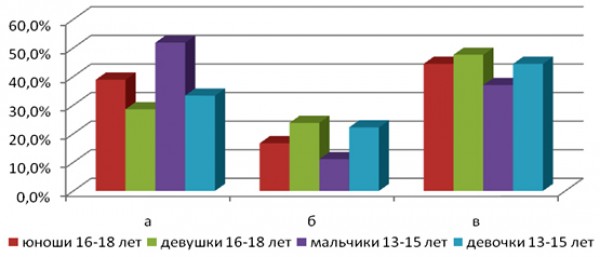
Figure 3. Distribution by groups of respondents of answers to the question "Do you use more slang words when communicating on the Internet than when communicating verbally?":
a) more; b) less; c) same
When viewing the open Internet correspondence of adolescents, it was also possible to note interesting feature texts: since it is impossible to express expression in voice or intonation in messages, other means are used: repetition of the same letter, capital letters, alternation of lowercase and uppercase letters: “Daaaaaaaaaaaaa!”, “I DON’T KNOW”, "Congratulations!". There are also words that express nothing but expression: “Wow!”, “Cool!”. Mostly girls use this way of expressing emotions.
In order to confirm or refute the hypothesis about the decline in the value of the spoken and written word among adolescents, the author of the article included in the survey a question in which the respondents had to explain the meanings of several proverbs and sayings about speech and the word.
The survey showed that only one saying - "The word is not a sparrow - you won't catch it" - practically did not cause any difficulties for the guys (out of 84 respondents, 66 people were able to explain its meaning). The meaning of the rest is clear only to a small part of teenagers: “What is written with a pen, you can’t cut it down with an ax” - 24 correct explanations, “For the sake of a red word, he will not spare his father” - 10; “Language will bring you to Kyiv” - 8. No one could explain the saying “You can’t sew a word into action”.
Since access to the Internet is now available almost anywhere in Russia, network communication erases not only the boundaries between oral and written speech, but also territorial boundaries. Differences in the vocabulary of provincial and metropolitan schoolchildren are no longer so noticeable, “anglicisms”, which A. V. Mudrik wrote about, are now characteristic of the speech of the absolute majority of the Kursk adolescents and adolescents surveyed, whose open correspondence the author observed in blogs and chats.
The second observation of Professor A. V. Mudrik that vulgarisms and “criminal vocabulary” are inherent in the speech of adolescents mainly from villages and small towns was also not confirmed during the study. This may be due to both the disappearance of the “information” territorial boundaries mentioned above, and the fact that the author conducted the study within the same city and did not have access to reliable data on the place of residence of adolescents who correspond in chats (data provided by adolescents themselves, not always trustworthy).
Reasons for the use of slang by Russian teenagers
When drawing up the research plan, the author set herself the task of not only describing the features of teenage slang, but also identifying the factors that encourage children to use this layer of language. For this purpose, the questionnaire included the question: "If you use slang, then why (arrange the listed reasons in order of importance, or give your answer)". The following answers were offered:
a) slang is cool, fashionable;
b) slang helps to express yourself more clearly;
c) slang helps you speak faster;
d) slang words help to overcome the lack of words in my speech;
e) other.
All of the listed factors were selected from those indicated by the adolescents themselves during the interviews, the number was reduced to four to simplify the ranking procedure.
Unfortunately, out of 84 respondents, only 48 were able to rank all the factors: at the age of 16-18 - 5 boys and 16 girls; at the age of 13-15 years, 14 boys and 13 girls.
Processing of expert opinions was carried out in two stages. At the first stage, an assessment was made of the consistency of opinions of the respondents included in each of the above groups, and the intra-group distribution of factors by importance was found. At the second stage, the consistency between the groups was assessed and the overall distribution of the importance of the factors was found.
The results of the first and second stages are summarized in Table 1.
Table 1
Ranking the main reasons for the use of slang by adolescents and assessing the consistency of opinions of individual groups of respondents
|
Consistency score |
The final distribution of causes by importance (arithmetic mean ranks) |
|||||||
|
S Crete |
||||||||
|
boys |
||||||||
|
General distribution |
||||||||
As the results of the survey show, adolescents of both identified age groups, both girls and boys, are unanimous on two points. All respondents ranked last among the reasons for using slang as “you think that slang is cool, fashionable” and in third place “slang words help overcome the lack of words in my speech”. Option "b" - "slang helps to express themselves more clearly and understandably" takes first place among boys aged 16-18 and girls 13-15 years old and, accordingly, second place among girls 16-18 years old and boys 13-15 years old. Option "c" "slang helps to speak faster" leads among girls aged 16-18 and boys aged 13-15 and takes second place among boys aged 16-18 and girls aged 13-15.
I would like to comment on the table. The fact that the answer “slang is cool, fashionable (a)” was in last place is somewhat puzzling, since the author has repeatedly observed how teenagers’ speech changes depending on the environment. In one company (school, yard) cheeky, “bold” speech is “in vogue”, while in another company (sections, circles) it is necessary to follow the expressions so as not to seem ill-mannered. Since it is very important for teenagers to speak the same language with their peers, having got into a team where slang is considered the norm of communication, many of them strive to meet the expectations of friends (follow the language fashion), often not caring about how they are perceived by adults.
The survey also showed that changes in their speech depending on the environment are also recorded by adolescents themselves: only 25 people (less than 30%) answered the question “In different companies do you use slang in the same way or differently”, and most of them (18 people) do not often use slang in any communication.
Therefore, the social factor, “what will my friends think of me” and “do I speak cool enough”, should, in our opinion, if not in the first, then at least in second place.
It is also interesting to note additional reasons for the use of slang by adolescents (the answer is “y”). Among them, the guys named the prevalence of slang among friends (the only possible language of communication), habit, and even the ability to prove their point of view with the help of slang. Only a few people from all respondents noticed the expressive coloring of slang and indicated that they need slang to express emotions.
conclusions
Summing up, we can say the following about the linguistic and stylistic features of the slang of Russian teenagers. Teenage slang is characterized by high expressiveness. There are metaphors, words with bright evaluative coloring, slang is enriched by borrowings from foreign languages, as well as computer slang.
In teenage slang, the following trends can be traced. The desire to reduce words, deliberately distorting, abbreviating, using incorrect grammatical forms comes from the desire of adolescents, firstly, to isolate themselves from the rest of society, to create their own language that is not understandable to “strangers”, and, secondly, to speak quickly. Opposing oneself to officialdom is the main feature of teenage slang.
Rudeness, near-censorship words are another feature inherent in the slang of teenagers. Teenagers want to seem like adults, express their opinion, and it seems to them that the more obscenely they express themselves, the more weighty their words will sound. Slang softens taboo vocabulary, rearranging, replacing letters, leaving its meaning, but slightly detracting from the rudeness of what was said.
Let me disagree with the opinion of linguists that many words from teenage and youth slang are no longer used. In my opinion, the slang of other age groups "grows" precisely from teenage slang. And if, for example, today you cannot hear the word "cabbage" in relation to money from some teenager, then adults use it quite often, since this word was used when they were teenagers. In addition, many positions of slang pass into the normative vocabulary. Let's compare, for example, the originally slang words "party", "fan". These words can be heard from the lips of television and radio hosts.
AT social aspect Teenage slang is a very interesting phenomenon. At its core, it is a code language that is the key to understanding the world of teenagers. Adolescence- this is a very difficult period, it is associated with constant stress, often leading to isolation or, on the contrary, antisocial behavior. This age is a stage that needs to be passed, and how it is overcome will affect the future. life path. The task of adults is to help the child survive a difficult time, and for this it is necessary to understand what the child is talking about. A parent who does not know teenage slang may miss, “listen to” the first alarm signals and not take action during the action. That is why we adults must be familiar with this "alien language" in order to help children on their way to adulthood.
The life of teenage slang does not stand still. This is the most lively and mobile layer of slang. Some words gradually fall out of use, and new ones appear in their place. Each new generation comes up with its own designations for surrounding objects. Now you will rarely see the word “I’m trudging”, they’ll rather say “I’m dying”, “Prus”. Rarely will anyone say "girl", "bummer". Rather, "chika", "sadness". Reality itself is changing. Some thirty years ago there was nothing to call "computer", "beech", or "empetrishnik". The language needs a name for new concepts, and teenage slang quickly responds to the needs of the language, coming up with short, but clear and precise words. The life of teenagers is best reflected in their language - slang, which absorbs everything new, important, significant.
Bibliography:
- Aguzarova, K.K. Youth slang // Daryal. - 2004. - No. 6, [electronic resource] - Access mode. - http://www.darial-online.ru.
- Aivazyan S.A., Enyukov I.S., Meshalkin L.D. Applied statistics, research of dependencies / edited by Ayvazyan S.A. M., 1985. - 487 p.
- Beregovskaya, E.M. Youth slang: formation and functioning // Questions of linguistics, 1996. S. 32-41
- Vadzinsky R. Statistical calculations in the Excel environment. user library. - St. Petersburg: Peter, 2008. - 608 p.
- Efremova T.F. Modern dictionary Russian language in 3 volumes / - M .: AST: Astrel, 2006.- v.3. - 973 p.
- Kon I.S. Psychology of early youth. - M., Education, 1989. - 256 p.
- Mudrik, A. V. Modern high school student: problems of self-determination. - M.: Knowledge, 1977. - 64 p.
- Popova N.N., Shvaibovich E.A. Informal teenage groups// Proceedings of the regional seminar "Organization of work on the prevention of extremism and the formation of tolerant behavior among young people", Tambov 2010. - P. 2.- Access mode: http:// doto.ucoz.ru/www/method-material-neformal.pdf
Since the number of studied reasons for the use of slang is small (equal to four), the consistency of opinions was assessed using statistics S, which is included in the Kendall concordance coefficient. Critical values of statistics at a significance level of 5% were found according to the tables [ 4] . Since the observed values S significantly exceed the critical ones, it can be concluded that the agreement of opinions both within groups and between groups is high.




